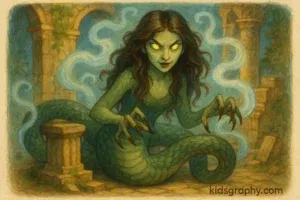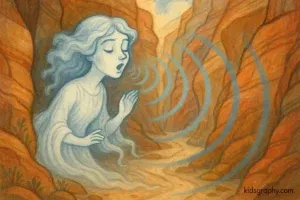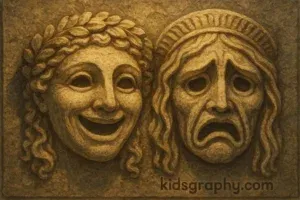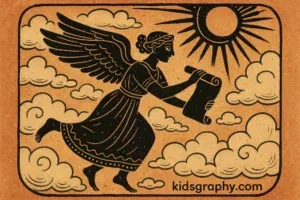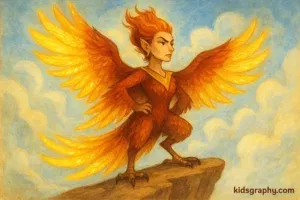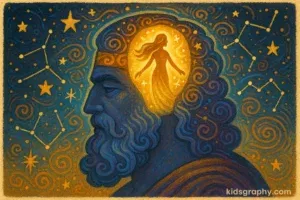Among the many powerful figures in ancient Greek stories, Asteria shines quietly but brightly. She wasn’t loud or famous like Zeus or Athena, but her name, which means “starry one,” tells us that she ruled over the night skies, falling stars, and heavenly prophecies.
Let’s discover the story of Asteria in Greek mythology, a Titaness connected to stars, dreams, and even magic.
Read More: Cronus in Greek Mythology: Titan of Time and Power
Who Is Asteria in Greek Mythology?
Asteria was a Titan goddess, born long before the Olympian gods came to power. She was one of the children of Phoebe and Coeus, both Titans of wisdom and knowledge.
Asteria’s name means “of the stars,” and she was closely linked to nighttime, shooting stars, and oracles. Some myths also say she had a connection to necromancy and dreams—things that happen in the dark and are hard to explain.
Unlike other goddesses, Asteria didn’t seek glory or power. She stayed mysterious, like the quiet night sky she ruled.
Read More: Hera in Greek Mythology: Queen of the Gods
Goddess Asteria and the Starry Night
As the goddess of stars, Asteria represented falling stars (meteors) and nighttime signs that people used for divination—which means telling the future.
People believed she sent dreams and signs from the sky to guide prophets and seers. Her presence was felt more in the stars than in temples.
Unlike some goddesses who lived on Mount Olympus, Asteria was part of the Titan generation—those who ruled before the Olympians.
Read More: Chaos in Greek Mythology: The First Being of Creation
Asteria’s Escape and Transformation
One of the most famous parts of Asteria’s story is how she escaped Zeus.
Zeus, known for chasing many women, desired Asteria. But she didn’t want to be taken by him. So, she jumped into the sea to escape and transformed herself into a floating island.
That island became Delos, the future birthplace of Apollo and Artemis.
This part of the myth shows Asteria’s power to choose freedom over fear—even if it meant becoming something entirely new.
Read More: Persephone in Greek Mythology: Queen of the Underworld
Hecate and Asteria: The Mother of the Moon Witch
Asteria later became the mother of Hecate, the goddess of magic, ghosts, and the moon.
Hecate is sometimes linked to Nyx, the goddess of night, but in many myths, she’s described as the daughter of Asteria and Perses (a Titan of destruction).
This makes Asteria important not just as a goddess of the stars, but also as a source of magical power and mystery passed on to her daughter.
Read More: Titans in Greek Mythology: Gods Before Olympus
Asteria’s Family in Greek Mythology
Let’s look at her family tree to understand how she fits into the world of Greek gods:
- Parents: Phoebe (goddess of intellect and prophecy) and Coeus (god of the axis of heaven)
- Sister: Leto (mother of Apollo and Artemis)
- Husband: Perses (Titan of destruction)
- Daughter: Hecate (goddess of witchcraft and the moon)
This means Asteria was aunt to Apollo and Artemis, and mother to Hecate—making her part of a powerful and mystical family line.
Legacy of Asteria: A Goddess in Silence
Though Asteria isn’t mentioned often in Greek myths, her presence is powerful. She doesn’t fight in wars or battle monsters. Instead, she represents:
- The mystery of the night sky
- Freedom and independence
- The passing of ancient knowledge to future generations
Her island, Delos, became a sacred site for worshiping Apollo and Artemis. And through her daughter Hecate, Asteria’s magic continued to influence the world.
Read More: Pandora in Greek Mythology: The First Woman’s Curse
Asteria as the Island of Delos
One of the most fascinating parts of Asteria’s myth is how she transformed into an island. To escape Zeus’s pursuit, she threw herself into the sea and became a drifting island called Delos.
At first, Delos floated aimlessly on the sea, without a home or anchor. But later, Leto, Asteria’s sister, found refuge there while pregnant with Apollo and Artemis.
The gods allowed Leto to give birth on Delos because it was not attached to the earth—avoiding a curse placed by Hera. After Leto gave birth, Delos became sacred, and the island was anchored firmly in place.
This part of Asteria’s story shows her as more than a goddess—she became a literal foundation for the birth of powerful gods.
What Does Asteria Symbolize?
Though not a major character in popular Greek myths, Asteria carries deep meaning. She represents:
- The night sky and falling stars – She connects the heavens to human dreams.
- Freedom and resistance – She chose to flee and change rather than be controlled.
- Mystical knowledge – As the mother of Hecate and daughter of prophetic Titans, she links to divination and magic.
- Transformation – Her change into Delos shows adaptability and strength.
She may be quiet in the myths, but her role is crucial—she connects cosmic power, independence, and hidden strength.
Read More: Hermes in Greek Mythology: Messenger of the Gods
Asteria in Modern Culture
Though not as well-known as Athena or Hera, Asteria has inspired modern writers, artists, and fantasy stories. She appears in:
- Modern retellings of Greek myths, especially those focused on Titan goddesses and female power.
- Fantasy novels and games, where she’s portrayed as a mysterious star goddess or magical figure.
- Astrology and mysticism circles, where Asteria is associated with the stars, dreams, and night rituals.
Her myth continues to inspire people who look to the sky for answers, or who admire her quiet strength.
More Stories: Asteria in Greek Mythology
FAQ: Asteria in Greek Mythology
Asteria is a Titaness goddess of stars, night, and prophetic dreams. She is the daughter of Phoebe and Coeus.
She is known for transforming into the island of Delos to escape Zeus and for being the mother of the goddess Hecate.
Yes, Asteria is the mother of Hecate, the goddess of magic, witchcraft, and the moon.
Asteria ruled over falling stars, oracles, night visions, and heavenly signs used for prophecy.
To escape Zeus’s advances, Asteria dove into the sea and transformed into a floating island, later becoming the birthplace of Apollo and Artemis.
Read More:Athena in Greek Mythology: Goddess of Wisdom & War





